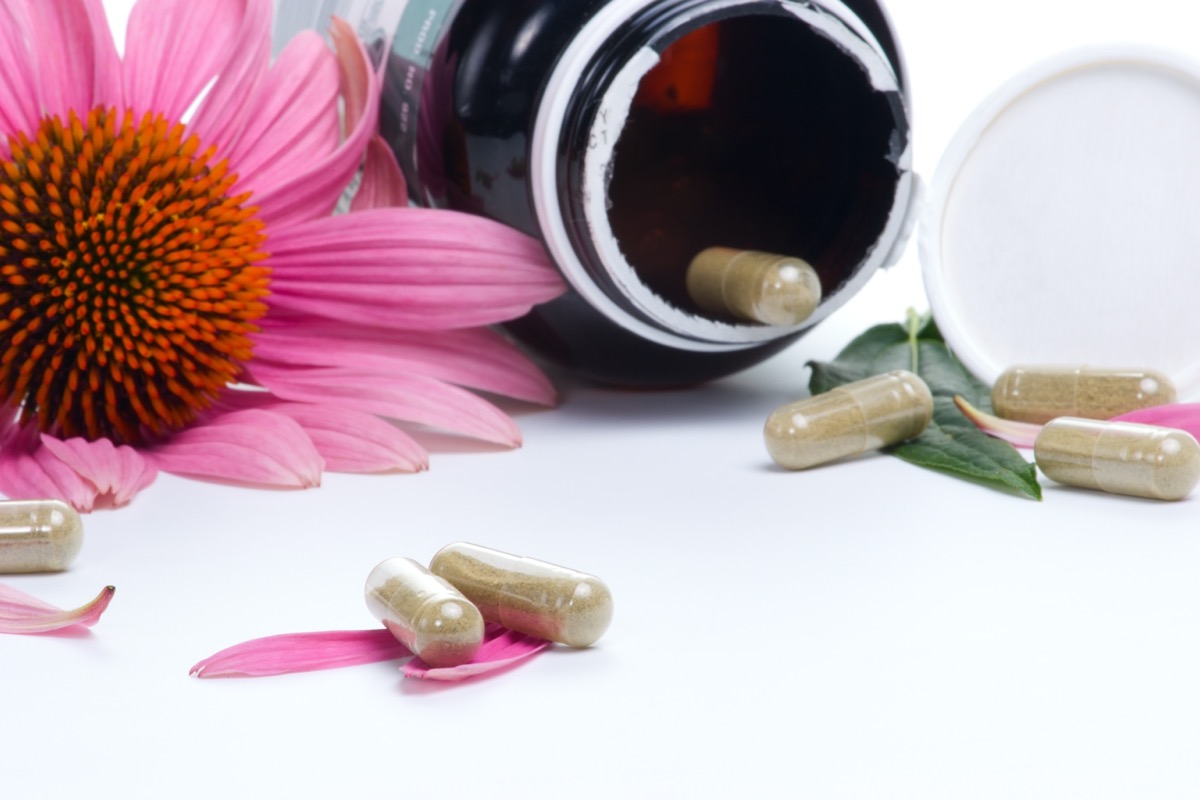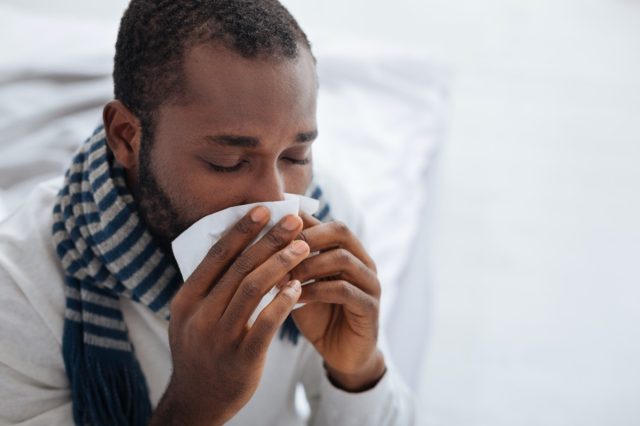What Happens to Your Body When You Take Echinacea Every Day

If the COVID-19 pandemic taught us anything, it's the critical importance of taking good care of your immune health. And with the cold and flu season upon us, now's the time to support your immune system so you can stay healthy and active throughout these chillier months. In addition, when you come down with an illness, it's essential to get enough rest, drink plenty of fluids, and use herbal remedies to help you feel better. One such herbal remedy that some use to fend off or shorten the duration of the common cold or the flu is echinacea.
A Native American medicinal plant, echinacea's popularity results from its reputation as an herbal supplement capable of helping to boost your immune system, reduce cold and flu symptoms, and fight infections. As Mount Sinai Hospital reports, many studies have indicated that echinacea's ability to support immune function, alleviate pain, and calm inflammation due to the active substances it is comprised of, and it has hormonal, antiviral, and antioxidant properties that support good health. While echinacea may offer many potential health benefits—with archeological evidence of its usage as a viable remedy dating back centuries, the inconsistent outcomes of various studies assessing its ability to prevent or reduce symptoms of the common cold, flu, or other viral infections have resulted in mixed views on its potential efficacy.
"Echinacea may help reduce the chances of catching a cold," Blanca Garcia, RDN, a registered dietitian nutritionist with HealthCanal, tells Eat This, Not That! "Although, there isn't enough research to indicate that echinacea can treat or cure any diseases."
Given these inconsistencies, you may wonder whether or not consuming echinacea supplements daily can impact your health. Is this herbal supplement good for you? Is it unsafe? Is it even effective at all? Read on to find out exactly what happens to your body when you take echinacea every day—then be sure to also check out 6 Best Foods to Get More Zinc & Boost Your Immune System.
Echinacea may support your immune system

Echinacea is most widely known for its immune health benefits, specifically for helping reduce symptoms of the common cold and flu. However, the research on echinacea's effects on the immune system provides mixed results. Some studies show the herb can lessen illness symptoms and help you recover faster, while others suggest echinacea has no benefits whatsoever. All things considered, echinacea is still a safe herbal remedy that doesn't hurt to try when you feel yourself coming down with something.
"Echinacea can be taken as a supplement," says Garcia. "Most research on echinacea has been geared toward its benefits for upper respiratory issues."
Although more conclusive research is needed on the extent of its effectiveness, research has also noted that echinacea is still a safe herbal remedy that doesn't hurt to try when you feel yourself coming down with something. The catch, however, is that since echinacea isn't considered an essential nutrient, there aren't any established lower or upper limits for a safe amount to consume. So if you attempt to try this herbal supplement, Garcia advises just being very selective about the supplement you choose.
"If echinacea is consumed as a supplement, there's a possibility of inconsistencies in the chemical compositions that can make supplements differ significantly," says Garcia."The best choice would be a manufacturing company with third-party testing for quality assurance and potency."
It can help prevent cell damage
Echinacea plants are loaded with antioxidants—molecules that protect your cells against free radical damage, also called "oxidative stress." Free radicals are harmful substances produced when your body digests unhealthy food or is exposed to toxic chemicals. A large body of evidence indicates oxidative stress can be responsible for several chronic diseases, including cancer, heart disease, and diabetes. Fortunately, some of the antioxidants found in echinacea, like flavonoids, cichoric acid, rosmarinic acid, may help to prevent free radicals from wreaking havoc on your cellular health.
It may improve your skin & even reduce wrinkles

If you suffer from eczema or other skin conditions, echinacea may help resolve your skin care woes. In a 2017 study published in the Journal of Dermatological Science, researchers concluded that skin care creams containing the echinacea purpurea extract improved eczema symptoms and helped overall skin health. Another smaller study from 2010 published in the International Journal of Cosmetic Science also found that skin care products containing echinacea extracts can hydrate your skin and even diminish the appearance of wrinkles.
It may upset your stomach
Echinacea supplements are generally considered safe and have been well-tolerated for short-term use. While many people have found echinacea helpful for the short-term relief of cold and flu symptoms, taking this supplement for an extended period of time or reliance on it as a panacea for any and all ailments is not recommended. According to Garcia, long-term use of these supplements can sometimes trigger minor adverse side effects.
"Some reported side effects of too much consumption may be gastrointestinal issues, like stomach ache or nausea," says Garcia.
"Short-term consumption of echinacea may not cause side effects," Garcia adds. "But for long-term everyday use, [this] is currently unknown; there isn't enough research to support everyday use."
Final takeaways
So next time you feel a cold or flu coming on, taking echinacea might be able to help. And when you catch signs of aging or unsightly, inflamed eczema patches on your skin, topical applications of skin care products containing echinacea may help restore your skin to its natural healthy glory. However, when it comes to the best ways to manage and treat these conditions, depending solely on a single herbal supplement likely will not be enough to cut it. Maintaining a consistently healthy diet, staying hydrated with lots of fluids, getting lots of rest, and taking time to exercise will more likely pave the way to a speedy recovery. And of course, be sure to consult your healthcare provider to learn exactly which treatments options are truly best for you.
- Source: https://www.sciencedaily.com/releases/2007/06/070626152809.htm
- Source: https://www.mountsinai.org/health-library/herb/echinacea
- Source: https://www.ncbi.nlm.nih.gov/pmc/articles/PMC4068831/
- Source: https://pubmed.ncbi.nlm.nih.gov/24868871/
- Source: https://www.mcmasteroptimalaging.org/full-article/ed797fd8fcc1042a0a38dbfea35a9bb3
- Source: https://pubmed.ncbi.nlm.nih.gov/29749084/
- Source: https://www.ncbi.nlm.nih.gov/pmc/articles/PMC5551541/
- Source: https://pubmed.ncbi.nlm.nih.gov/26009695/
- Source: https://pubmed.ncbi.nlm.nih.gov/28610718/
- Source: https://pubmed.ncbi.nlm.nih.gov/20384903/
- Source: https://www.nccih.nih.gov/health/echinacea#:~:text=The%20most%20common%20side%20effects,caused%20by%20an%20allergic%20reaction.









